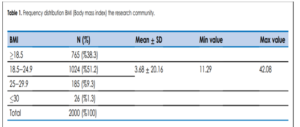Required Resources
Read/review the following resources for this activity:
- OpenStax Textbook: Chapter 2
- Lesson
- Chamberlain University Library
- Internet
Scenario/Summary
This week’s lab highlights the use of graphics, distributions, and tables to summarize and interpret data.
Follow the directions below to find one of the given academic articles from the Chamberlain library and then use that to describe the graphs and tables included. Further, you will describe other ways that the same data could be presented.
Deliverables
The deliverable is a Word document with your answers to the questions posed below based on the article you find.
Required Software
- Microsoft Word
- Internet access to read articles
Steps to Complete Week 3 Lab
Step 1: Go to the Chamberlain Library at: https://library.chamberlain.edu (Links to an external site.) .
Step 2: Click Databases in the Search the Library block. Then choose ProQuest Nursing and Allied Health Database in the dropdown menu.

Step 3: Below, you will find the titles of six articles from the ProQuest database that show a frequency distribution within the article. CHOOSE ONE OF THE ARTICLES FROM THE LIST BELOW. You will perform two searches using this article.
-
- For our first broad-based search, use the underlined words in your chosen article to search and see how many articles from the database contain these underlined words (see the example below the article list for an example search on post-partum depression).
Article Titles
-
-
-
-
- Oral manifestations in diabetic patients under treatment for ischemic heart diseases: A comparative observational study
- Systolic blood pressure , diastolic blood pressure, and pulse pressure: An evaluation of their joint effect on mortality
- The Relationship Between Body Mass Index (BMI) and Menstrual Disorders at Different Ages of Menarche and Sex Hormones
- Adolescents’ first tobacco products: Associations with current multiple tobacco product use
- Association of lifestyle modification and pharmacological adherence on blood pressure control among patients with hypertension at Kenyatta National Hospital, Kenya: A crosssectional study
- Demographic, parental, and personal factors and youth athletes’ concussion -related knowledge and beliefs
-
-
-



-
-
- For our second more narrow search, go back and search for the title of the article that you chose originally. Type A PORTION of the article title into the search bar and find the full PDF for that article.
-
Step 4: Complete your lab by taking the following steps
-
-
-
-
- Copy and paste, or post a screen shot of the frequency distribution from the article you chose at the top of your Word document.
- On your first search, what terms did you use, and what other things did you mark on the search page before conducting your search? Why did you choose the article that you did? How many articles were found with these search terms? Give the full APA reference of the article you are using for this lab.
- What data are shown in the frequency distribution and why might it be of interest? Include the size of the classes, noting if they are of a consistent size or not. Also include a conclusion that could be made from the frequency distribution. (1 to 2 paragraphs)
- How else might these data have been displayed? Discuss pros and cons of 2 other presentation options, such as tables or different graphical displays (1 to 2 paragraphs)
-
-
-
Step 5: Be sure your name is on the Word document, save it, and then submit it under “Assignments” and “Week 3: Lab”.
Solution:
Week 3 Assignment: Lab

On my first search, I used the terms “Body Mass Index”. On the search page, I noted the number of results, which was 156,088. Given the high number of articles found, I had to narrow down the search. This was by adding more terms including “Menstrual Disorders at Different Ages of Menarche and Sex Hormones”. The narrow result returned 709 articles. I selected the first article. The APA reference of the article is as depicted below;
Please click the icon below to purchase full answer at only $15
